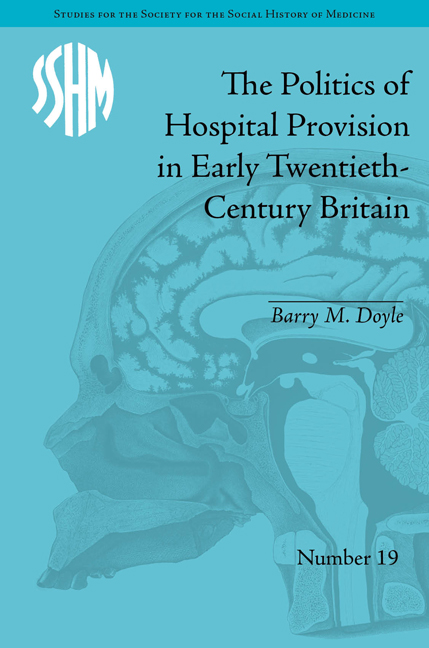Book contents
- Frontmatter
- CONTENTS
- Dedication
- Acknowledgements
- List of Tables
- Introduction
- 1 Leeds and Sheffield: Economic, Social and Political Change
- 2 Hospital Provision: Voluntary and Municipal
- 3 Patients and Access
- 4 Specialization and the Challenges of Modern Medicine
- 5 Finance
- 6 The Politics of Hospital Provision
- 7 Co-operation, Competition and the Development of Hospital Systems
- Conclusion
- Notes
- Works Cited
- Index
Conclusion
- Frontmatter
- CONTENTS
- Dedication
- Acknowledgements
- List of Tables
- Introduction
- 1 Leeds and Sheffield: Economic, Social and Political Change
- 2 Hospital Provision: Voluntary and Municipal
- 3 Patients and Access
- 4 Specialization and the Challenges of Modern Medicine
- 5 Finance
- 6 The Politics of Hospital Provision
- 7 Co-operation, Competition and the Development of Hospital Systems
- Conclusion
- Notes
- Works Cited
- Index
Summary
Historians of the pre-NHS hospital system have addressed a number of themes in recent years: the scale and speed of development of both voluntary and municipal hospitals; the rise of specialist services; the central part played by finance in hindering or promoting change; the role of politics; and the extent of collaboration and co-operation within and between the sectors at an urban and regional level. This book has been concerned with exploring each of these themes in two localities, providing a comparison of developments within Leeds and Sheffield and placing those trends within their wider national context. The two cities examined here provide important perspectives; by focusing on regional centres with medical schools, we have been able to assess change in the most highly developed part of the contemporary hospital system. Historians have often dismissed such places as atypical with their experiences having little to tell us about small towns, rural areas or places struggling with limited resources and the effects of depression. Yet, as Pickstone observed in relation to his study of the north-west:
To gain a more adequate perspective we must also consider Manchester itself: not just because any hospital service planned for a nation must solve the peculiar problems of large cities but because the problems which were more evident in Manchester than elsewhere in the Region, came to dominate the planning of the NHS.
- Type
- Chapter
- Information
- Publisher: Pickering & ChattoFirst published in: 2014



